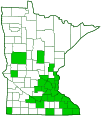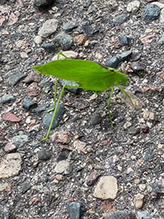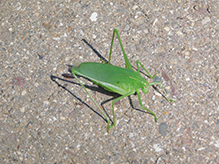oblong-winged katydid
(Amblycorypha oblongifolia)
Conservation • Description • Habitat • Ecology • Distribution • Taxonomy
|
|
||||||||||||||
Description |
Oblong-winged katydid is a long-horned, round-headed katydid (genus Amblycorypha). It occurs in eastern North America, Mexico, and Central America. In the United States it is common east of the Great Plains. It is found mostly in damp areas on trees, shrubs, and tall weeds in the understory of deciduous forests, at the edges of thickets, and in gardens. At 1⅝″ to 2″ (42 to 52 mm) long, oblong-winged katydid is the largest round-headed katydid. Their overall color varies but is genetically inherited. The head, body, wings, and legs are usually leaf green, occasionally yellow, rarely tan, orange, brown, or pink. The head is oval. The top of the head is rounded and strongly curved backward. The face is vertical. The eyes are oval. The antennae are very long and extend well beyond the tip of the abdomen. They are thread-like and have many segments. They are attached high on the face and far apart. The forehead projects forward between the antennae. The pronotum does not have two small dark spots on each side. On each side the lateral lobe of the pronotum has a deep sinus at the rear upper corner (humeral angle). The leathery forewings (tegmina) are elongated-oval and 3.1 to 4 times as long as wide. They are held roof-like over the body. A small area at the base of the wing is horizontal and very dark. On the male, this is the stridulatory field. There is a row of bumps (a file) on the underside of the upper wing and a sharp edge (blade) on the upper side of the lower wing. By rubbing the file against the blade, the male produces its distinctive song, a short, high-pitched, 9 kHz “zeee-dik!” that is repeated every few seconds. The female wings are similar but do not have these two sound-producing structures. The hindwings are membranous, broad, and long. They are folded fan-like under the tegmina when at rest. They are longer than, and not completely covered by, the tegmina. On the female the ovipositor is shorter than the abdomen, flattened, curved upward. The front legs are short, the middle legs a little longer, the hind legs much longer. The third segment (femur) of the hind leg extends almost but not quite to the tips of the tegmina. The end section of the leg (tarsus), corresponding to the foot, has four segments. |
Size |
Total length: 1⅝″ to 2″ (42 to 52 mm) |
Song |
Similar Species |
Habitat |
Deciduous forests, gardens |
Ecology |
Season |
One generation per year: June through September |
Behavior |
|
Life Cycle |
Eggs are deposited in the soil. |
Nymph Food |
Plant juices |
Adult Food |
Leaves of deciduous plants |
Distribution |
||
|
Sources The Orthoptera of Minnesota, Volumes 76-90, University of Minnesota, Agricultural Experiment Station, 1932, p. 58. |
|
| 8/11/2025 | ||
Occurrence |
||
Common |
||
Taxonomy |
|
Order |
Orthoptera (Grasshoppers, Crickets, and Katydids) |
Suborder |
Ensifera (katydids, crickets, and allies) |
Infraorder |
Tettigoniidea (katydids, wētā, and allies) |
Superfamily |
Tettigonioidea |
Family |
Tettigoniidae (katydids) |
Subfamily |
Phaneropterinae (leaf katydids) |
Tribe |
Amblycoryphini |
Subtribe |
Amblycoryphina |
Genus |
Amblycorypha (round-headed katydids) |
Subordinate Taxa |
|
|
|
Synonyms |
|
Amblycorypha scudderae Amblycorypha scudderi Locusta oblongifolia Phylloptera oblongifolia |
|
Common Names |
|
oblong-winged katydid |
|
Glossary
Femur
On insects and arachnids, the third, largest, most robust segment of the leg, coming immediately before the tibia. On humans, the thigh bone.
Ovipositor
A tube-like organ near the end of the abdomen of many female insects, used to prepare a place for an egg and to place the egg.
Tarsus
On insects, the last two to five subdivisions of the leg, attached to the tibia; the foot. On spiders, the last segment of the leg. Plural: tarsi.
Tegmen
The modified, leathery front wing of grasshoppers and related insects that protects the hindwing. It may also serve as a camouflage, a defensive display, or a sound board. Plural: tegmina.
Visitor Photos |
||
Share your photo of this insect. |
||
This button not working for you? |
||
Colleen Yankee |
||
Very pretty, never seen one before, he was friendly and let me hold him for a closer look |
||
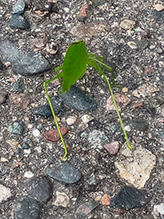 |
||
James Folden |
||
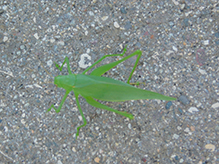 |
||
some type of katydid Some type of Katydid, about 1.5" long on an asphalt hiking path. Phaneroptera_falcata, curve tailed bush katydid, japanese katydid, all came up as matches |
||
Heather Wright |
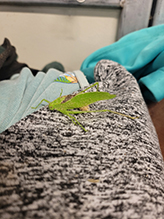 |
Alfredo Colon |
||
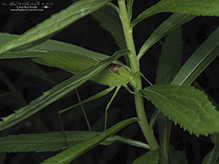 |
||
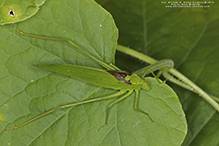 |
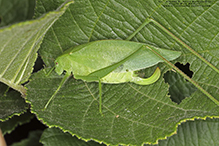 |
|
Misty Priest |
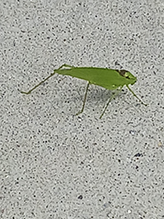 |
OBLONG-winged katydid |
JP |
||
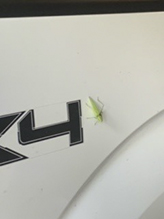 |
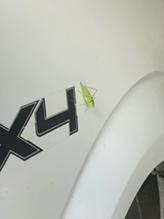 |
|
I found this on the side of our truck today. |
||
Norm & Peg Dibble |
||
On 08/12/2019, I was outside on our front sidewalk trimming flowers in pots and found this large bright green bug (with long antennae) on our sidewalk that looked like a grasshopper to me. It wasn’t alarmed by my closeness and the camera. I do not recall ever seeing one before. After looking on minnesotaseasons.com and other sites, I believe I found its ID. I’ve heard Katydids in our yard for years but never thought I was ever looking at one because I assumed they were up in the trees. That one eventually disappeared and I continued to trim flowers. I have a very large pot full of big, colorful Coleus plants, and discovered either the same Katydid or another one on a C deep inside the plant. It sure blended in so well with its leafy green textured wings! (Sorry about my purple silk flowers that its left foot is resting on!) What a really a fun sight for both Norm and I to see. |
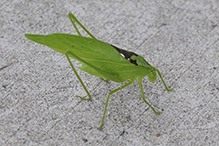 |
|
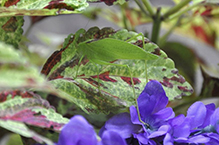 |
||
MinnesotaSeasons.com Photos |
||
|
||
|
||

Slideshows |
|

Visitor Videos |
||
Share your video of this insect. |
||
This button not working for you? |
||
|
Other Videos |
||
Amblycorypha oblongifolia eats human being |
About
Published on Aug 8, 2017 Such a tragedy. |
Katydid Song-Oblong Winged Katydid |
About
Published on Aug 28, 2013 This is the song of the male Oblong-winged Katydid (Amblycorypha oblongifolia) (Family: Tettigoniidae). He makes the song through "stridulation": rubbing his wings together. |
Oblong-winged katydid moving at full speed. |
About
Published on Aug 1, 2013 This oblong-winged katydid (Amblycorypha oblongifolia) is hauling ass across the deck in order to get away from the camera. Seriously, this is it moving as fast as possible until it decided to jump. |

Visitor Sightings |
||
Report a sighting of this insect. |
||
This button not working for you? |
||
Colleen Yankee |
Location: St Louis Park MN, by the West end in an apartment parking lot Very pretty, never seen one before, he was friendly and let me hold him for a closer look |
 |
Heather Wright |
Location: Columbus, MN |
 |
| Alfredo Colon 8/25/2022 |
Location: Woodbury, Minnesota |
 |
| Misty Priest 8/12/2023 |
Location: Salisbury, Ma |
 |
| JP 7/18/2021 |
Location: Howard Lake, MN (Wright County) I found this on the side of our truck today. |
 |
| Alfredo Colon 8/23/2019 |
Location: Woodbury, Minnesota |
 |
| Alfredo Colon August 2019 |
Location: Woodbury, Minnesota |
 |
MinnesotaSeasons.com Sightings |
||
|

Created: 8/30/2019 Last Updated: © MinnesotaSeasons.com. All rights reserved. |
